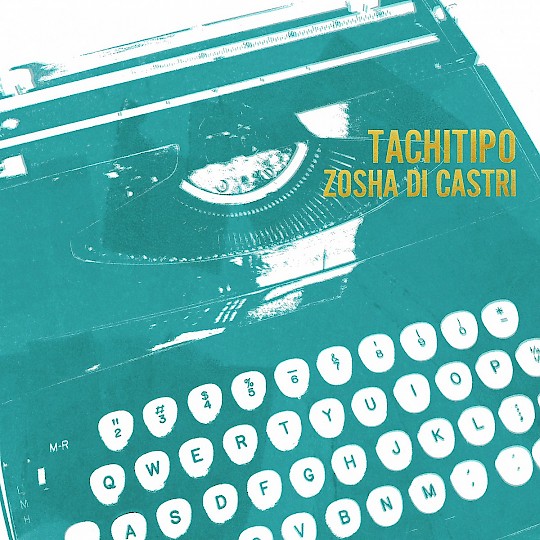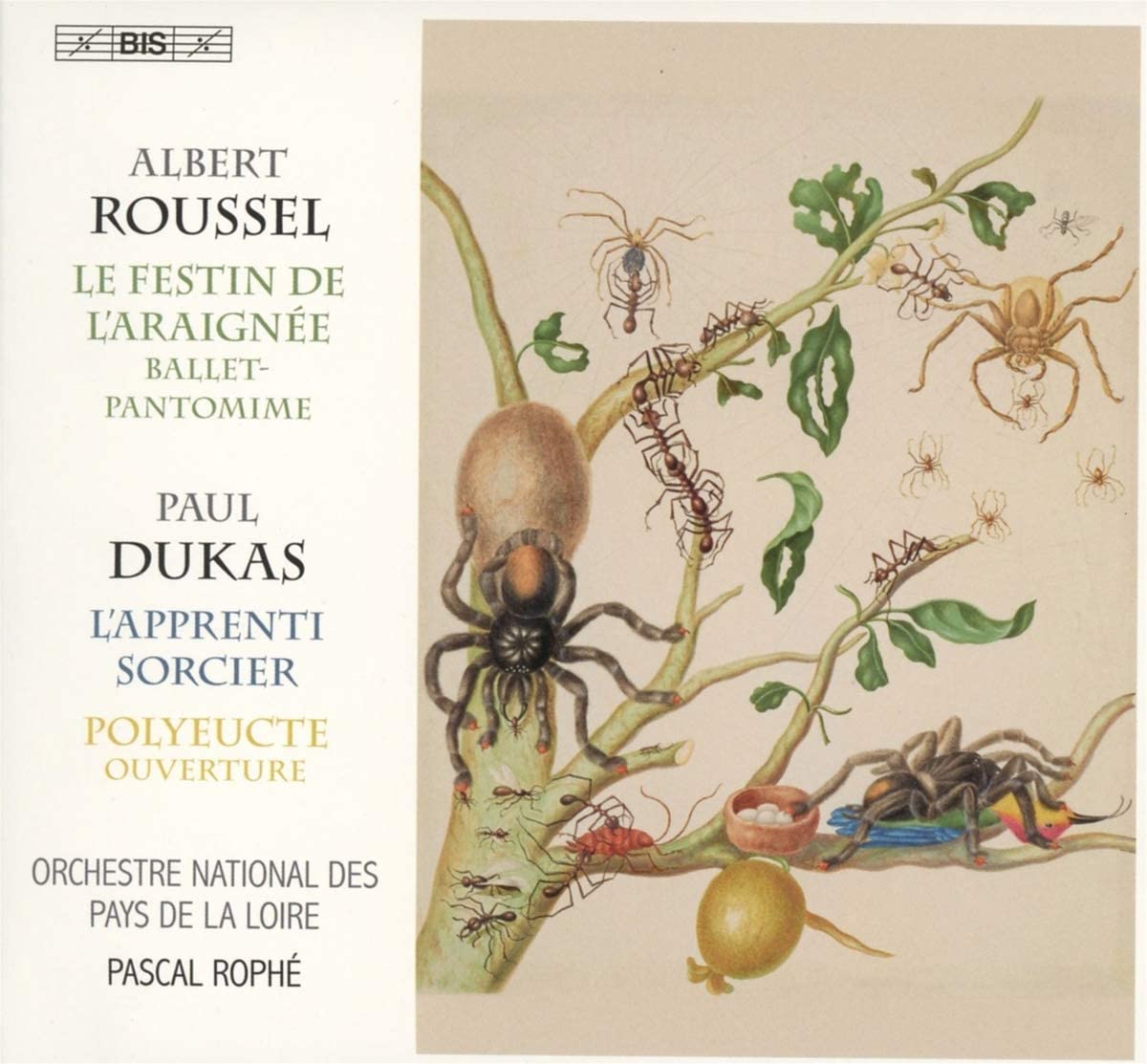Classical CDs Weekly: Bach, Zosha Di Castri, Dukas, Roussel | reviews, news & interviews
Classical CDs Weekly: Bach, Zosha Di Castri, Dukas, Roussel
Classical CDs Weekly: Bach, Zosha Di Castri, Dukas, Roussel
Baroque string suites, Canadian contemporary music and an insect-themed ballet

 Mike Block: Step into the Void (Bright Shiny Things)
Mike Block: Step into the Void (Bright Shiny Things)
The packaging and art design are deceptive; two-thirds of this release is actually a classy set of Bach’s Cello Suites (“... attempting to comprehend all of the Cello Suites as a single entity is truly like stepping into the void.”) . Cellist Mike Block has form in this repertoire. He’s the creator of the Block Strap, “the first product designed so that you can stand/move/dance while playing the cello,” using his invention to help make video recordings of individual Bach movements in the bathrooms of famous concert halls. Block has nearly finished the cycle, the results both sonically and musically satisfying. There's a link to the videos on his website, if you're curious. This audio set of the six suites was recorded over just two days, Block allowing himself just two takes for each movement. They're winning performances, Block understanding each suite’s distinct character and projecting it with a minimum of fuss. Suite No. 5 has a splendidly gnarly opening movement, Block really digging into the “Courante”. Movements which sometimes pass me by really register here, the flowing Prelude to the 6th Suite compelling in terms of colour, and never just a sequence of repeated Ds. Block makes Bach's dances swing, and moments like the opening of the C Major suite unfold with conversational ease. I'm a big fan of Alban Gerhardt's recent cycle, but Block is definitely a keeper.
The bonus disc is a live recording, giving us Block’s improvisations and straight performances of long stretches of Bach accompanied by performance artist Barry Rothman, mostly wielding his eclectic record collection. The results are a lot of fun, Block interacting with scratchy snatches of spoken word or funky instrumentals. Bach usually gains the upper hand. Block’s little Prelude to a Dream, a plucked tour-de-force, makes for a delightful encore.
 Zosha Di Castri: Tachitipo (New Focus Recordings)
Zosha Di Castri: Tachitipo (New Focus Recordings)
Tachitipo? The title work on this disc showcasing music by the Canadian composer Zosha di Castri refers to an early 19th century Italian typewriter. Scored for two pianos, percussion and electronics, it's a compelling single movement structure. Stretches of metallic taps and creaks evoke the typewriter’s sound, Di Castri’s music hinting at one downside of office mechanisation, namely that the women employed en masse to do the typing were powerless: “… this was a dictation job good girls did before getting married… not unlike the piano lessons previous generations undertook to attract suitors.” A spare, uneasy peace is only achieved in the final minutes. There's a fierceness, a restlessness to Di Castri's music. Her pieces aren't easy listening but you're compelled to return for repeated doses. The Animal After Whom Other Animals Are Named has its six vocalists singing, chanting and whispering a text by Nicole Sealey about the effects of age; again, there's a poignancy to the loss of energy and spark in the closing section.
That String Quartet No. 1’s dizzying thickets of sound are produced by just four players is remarkable; the musical argument may be difficult to follow on first hearing, but it offers an exhilarating shot of adrenalin to the curious. There's more; Cortège’s thirteen musicians deliver a stuttering, chaotic processional, and the piano solo Dux is a thunderous, percussive explosion. The performances are consistently impressive: Ekmeles astound in the vocal work and the JACK Quartet are unfazed by Di Castri's technical demands. Everything's brilliantly engineered, and artist Kiva Stimac deserves a shoutout for her packaging and design. There's also a bonus video track online: how many bodies have we to pass through is an absorbing virtuoso work for solo percussion. An Diego Espinosa Cruz Gonzalez does it justice.
 Dukas: Overture to Polyeucte, The Sorcerer’s Apprentice, Roussel: The Spider’s Feast Orchestre National des Pays de la Loire/Pascal Rophé (BIS)
Dukas: Overture to Polyeucte, The Sorcerer’s Apprentice, Roussel: The Spider’s Feast Orchestre National des Pays de la Loire/Pascal Rophé (BIS)
“I wrote this little ballet very quickly… didn't foresee the success it would later have, and I regarded it as nothing more than an entertainment of no great importance.” Albert Roussel's withering put-down of his delectable 1913 ballet The Spider’s Feast is best taken with a pinch of salt. Erato’s superb Roussel box set includes excerpts conducted by the composer in 1929. It's essential listening if you've a fondness for one of 20th century music’s unsung heroes, as is this glowing new version of the complete score. Unfolding over a single day in the corner of a garden, Gilbert de Voisins’ scenario ends badly, the titular spider killed by a praying mantis she's tried to ensnare. Dung beetles, mayflies and ants make appearances. It's deliciously witty stuff, the music given to each creature so, so apt. Choice moments include scurrying ants and a magical depiction of a mayfly hatching. There's pathos too: the spider’s violent demise is deserved but oddly moving, and the ballet ends with a melancholy cortège for the mayfly. Pascal Rophé’s Orchestre National des Pays de la Loire relish this mercurial score’s quirks, wind solos nicely projected over a sumptuous string backdrop. As a way in to Roussel, this is excellent, after which I'd suggest his punchy Symphony No. 3.
Rophé's couplings are both by the similarly fastidious Paul Dukas. The Sorcerer's Apprentice gets a reading of sharp wit and exquisite refinement. Rophé whips up a proper storm as the music progresses, the brass terrifying near the close. It's marvellous, as is Dukas’s first large scale work, his Polyeucte, overture for a tragedy by Corneille. A heady blend of Franck and Wagner, it's dispatched with plenty of punch. A lovely disc, well-engineered and blessed with appealing sleeve art.
Explore topics
Share this article
The future of Arts Journalism
You can stop theartsdesk.com closing!
We urgently need financing to survive. Our fundraising drive has thus far raised £49,000 but we need to reach £100,000 or we will be forced to close. Please contribute here: https://gofund.me/c3f6033d
And if you can forward this information to anyone who might assist, we’d be grateful.

Subscribe to theartsdesk.com
Thank you for continuing to read our work on theartsdesk.com. For unlimited access to every article in its entirety, including our archive of more than 15,000 pieces, we're asking for £5 per month or £40 per year. We feel it's a very good deal, and hope you do too.
To take a subscription now simply click here.
And if you're looking for that extra gift for a friend or family member, why not treat them to a theartsdesk.com gift subscription?
more Classical music
 From Historical to Hip-Hop, Classically Black Music Festival, Kings Place review - a cluster of impressive stars for the future
From quasi-Mozartian elegance to the gritty humour of a kitchen inspection
From Historical to Hip-Hop, Classically Black Music Festival, Kings Place review - a cluster of impressive stars for the future
From quasi-Mozartian elegance to the gritty humour of a kitchen inspection
 Shibe, LSO, Adès, Barbican review - gaudy and glorious new music alongside serene Sibelius
Adès’s passion makes persuasive case for the music he loves, both new and old
Shibe, LSO, Adès, Barbican review - gaudy and glorious new music alongside serene Sibelius
Adès’s passion makes persuasive case for the music he loves, both new and old
 Anja Mittermüller, Richard Fu, Wigmore Hall review - a glorious hall debut
The Austrian mezzo shines - at the age of 22
Anja Mittermüller, Richard Fu, Wigmore Hall review - a glorious hall debut
The Austrian mezzo shines - at the age of 22
 First Person: clarinettist Oliver Pashley on the new horizons of The Hermes Experiment's latest album
Compositions by members of this unusual quartet feature for the first time
First Person: clarinettist Oliver Pashley on the new horizons of The Hermes Experiment's latest album
Compositions by members of this unusual quartet feature for the first time
 Gesualdo Passione, Les Arts Florissants, Amala Dior Company, Barbican review - inspired collaboration excavates the music's humanity
At times it was like watching an anarchic religious procession
Gesualdo Passione, Les Arts Florissants, Amala Dior Company, Barbican review - inspired collaboration excavates the music's humanity
At times it was like watching an anarchic religious procession
 Classical CDs: Camels, concrete and cabaret
An influential American composer's 90th birthday box, plus British piano concertos and a father-and-son duo
Classical CDs: Camels, concrete and cabaret
An influential American composer's 90th birthday box, plus British piano concertos and a father-and-son duo
 Cockerham, Manchester Camerata, Sheen, Martin Harris Centre, Manchester review - re-enacting the dawn of modernism
Two UK premieres added to three miniatures from a seminal event of January 1914
Cockerham, Manchester Camerata, Sheen, Martin Harris Centre, Manchester review - re-enacting the dawn of modernism
Two UK premieres added to three miniatures from a seminal event of January 1914
 Kempf, Brno Philharmonic, Davies, Bridgewater Hall, Manchester review - European tradition meets American jazz
Bouncing Czechs enjoy their Gershwin and Brubeck alongside Janáček and Dvořák
Kempf, Brno Philharmonic, Davies, Bridgewater Hall, Manchester review - European tradition meets American jazz
Bouncing Czechs enjoy their Gershwin and Brubeck alongside Janáček and Dvořák
 Solomon, OAE, Butt, QEH review - daft Biblical whitewashing with great choruses
Even a top soprano and mezzo can’t make this Handel paean wholly convincing
Solomon, OAE, Butt, QEH review - daft Biblical whitewashing with great choruses
Even a top soprano and mezzo can’t make this Handel paean wholly convincing
 Two-Piano Gala, Kings Place review - shining constellations
London Piano Festival curators and illustrious friends entertain and enlighten
Two-Piano Gala, Kings Place review - shining constellations
London Piano Festival curators and illustrious friends entertain and enlighten
 Echo Vocal Ensemble, Latto, Union Chapel review - eclectic choral programme garlanded with dance
Beautiful singing at the heart of an imaginative and stylistically varied concert
Echo Vocal Ensemble, Latto, Union Chapel review - eclectic choral programme garlanded with dance
Beautiful singing at the heart of an imaginative and stylistically varied concert
 Scott, Irish Baroque Orchestra, Whelan, RIAM, Dublin review - towards a Mozart masterpiece
Characteristic joy and enlightenment from this team, but a valveless horn brings problems
Scott, Irish Baroque Orchestra, Whelan, RIAM, Dublin review - towards a Mozart masterpiece
Characteristic joy and enlightenment from this team, but a valveless horn brings problems

Add comment